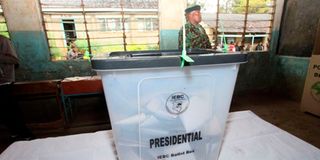Curbing effects of irresponsible campaigning

A police officer stands guard during the repeat presidential election in 2017.
During election campaigns, different groups work to prove they are worthy of the public’s choice as leaders. Ideally, campaigns are a marketplace of ideas, each competing on its own merit. However, this almost never works in real life, for many reasons.
Firstly, it seems easier to mudsling opponents than to come up with something new. Insults create “clickable” events or scandals, which increase the notoriety of offenders. This is also easier for media to focus on, thus becoming a diversion from pertinent issues, development agenda and policy promises.
Secondly, media practitioners also create skewed playing fields by furthering inequality in candidate and campaign visibility. Curated selections of the favoured few are given the lion's share of coverage. This leaves newer candidates, especially the youth and women, smaller political parties, and those running at the grassroots, very limited platforms and opportunities to talk to the public.
Thirdly, the creation of rival groups, specifically an “Us” that is “right”, and a “Them” that is “wrong”, has been used to galvanise community solidarity for some candidates, with bitter enmity towards others. This creation of violent binaries has resulted in deaths, like that of Baby Samantha Pendo and others, alongside injury and disabilities, displacement of thousands from their homes with inability to return, as well as loss and destruction of property, also a hallmark of campaigns gone horribly wrong.
Beyond the limitless psychological damage to Kenyans, this immeasurable trauma we have collectively suffered causes us to dread and anticipate further harm with each voting period.
Problematic moments
What then can be done to change this? For starters, much attention is given to supervising the vote at the very end, yet the whole process needs to be observed so as to pinpoint problematic moments with violent potential, and changes in public temperature.
It is thus imperative that political parties and stakeholders, including public representatives, form an independent caucus specifically to jointly monitor and provide reports on the campaign process from the start. Media must also be held to account, especially in news coverage and while advertising is, unfortunately, market-driven, current event reports should not be. News and analytical journalism should ensure that they share diverse campaigns, allowing more marginalised voices the opportunities they deserve to compete fairly.
The work of rectifying campaign wrongs should not be a government agenda to hand over every five years. All political stakeholders should be part of ensuring that justice is accorded swiftly to all those who have suffered campaign and electoral violence. This includes lobbying for and ensuring official state recompense for life and property losses, return and resettlement to home areas, and support with disability. The tinderbox of Kenyan campaigns has exploded before and, therefore, it is crucial to handle it responsibly and protect the public from problems in the future.
The writer is a policy analyst. [email protected]





